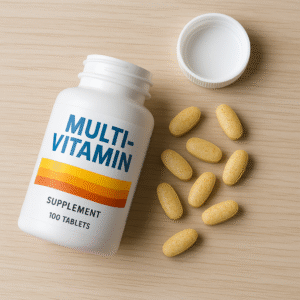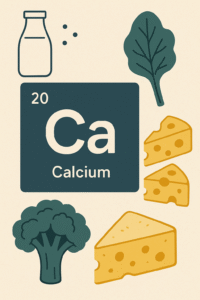Disclaimer:This post may contain affiliate links. If you purchase through these links, I may earn a small commission at no extra cost to you.
When it comes to building a foundation of wellness, we often think of vitamins like C, D, and B12, or superfoods packed with antioxidants. But there’s one essential mineral that quietly supports hundreds of processes in your body, often without getting the spotlight it deserves: magnesium. If you’re tired, stressed, struggling to sleep, or dealing with muscle aches, magnesium might be the missing piece in your wellness puzzle.
In this comprehensive guide, we’ll explore what magnesium is, why it matters, how deficiency affects you, the best dietary sources, the latest science on supplementation, and how to optimize your intake for energy, calm, and whole-body health.
What is Magnesium?
Magnesium is a naturally occurring mineral and electrolyte, vital for human health. It’s the fourth most abundant mineral in the body and is required for more than 300 biochemical reactions. Your muscles, nerves, bones, heart, and even your mood depend on adequate magnesium.
Key roles of magnesium:
- Energy production (ATP synthesis)
- Muscle contraction and relaxation
- Nerve impulse transmission
- Protein synthesis and DNA repair
- Blood sugar control
- Blood pressure regulation
- Bone strength and formation
It’s clear: magnesium is fundamental to feeling your best—from powering your workouts to supporting sound sleep.
Why is Magnesium Deficiency So Common?
Despite its importance, magnesium deficiency is surprisingly widespread. Estimates suggest that up to 50% of people in developed countries are not getting enough magnesium for optimal health.
Why is this happening?
- Modern diets: Highly processed foods are stripped of minerals, including magnesium. Fast food, white bread, and sugary snacks offer little to no magnesium.
- Soil depletion: Industrial farming has reduced the mineral content of our vegetables and grains.
- Stress: Physical and mental stress increases magnesium requirements and losses through urine.
- Medications: Common drugs like diuretics, proton pump inhibitors, and certain antibiotics can deplete magnesium.
- Digestive issues: Conditions such as Crohn’s, celiac disease, or chronic diarrhea impair absorption.
Signs and Symptoms of Magnesium Deficiency
Magnesium deficiency is known as “hypomagnesemia.” The symptoms can be subtle at first, but over time may seriously affect your well-being.
Common symptoms include:
- Muscle cramps, twitches, or spasms
- Restless legs
- Chronic fatigue or weakness
- Trouble sleeping or insomnia
- Headaches or migraines
- Increased stress, irritability, or anxiety
- Numbness or tingling in extremities
- Irregular heartbeat or palpitations
- Osteoporosis (long-term deficiency)
Because magnesium is involved in so many systems, a deficiency can mimic or worsen other health problems. If you recognize several of these symptoms, it’s worth talking to your doctor and considering your magnesium intake.
The Science-Backed Benefits of Magnesium
Magnesium isn’t just for people with obvious deficiencies. Even modestly increasing your intake can have powerful, wide-ranging benefits:
1. Promotes Deep, Restorative Sleep
Magnesium calms the nervous system, helping your brain and muscles relax. Clinical studies show magnesium can reduce the time it takes to fall asleep, increase deep sleep, and improve insomnia—especially in older adults.
2. Reduces Stress and Supports Mood
Known as “nature’s chill pill,” magnesium helps regulate neurotransmitters involved in stress, anxiety, and depression. Research links low magnesium with increased anxiety and suggests supplementation may relieve mild depression and stress.
3. Supports Muscle and Nerve Function
Magnesium helps muscles contract and relax. It’s essential for athletes and anyone prone to cramps, spasms, or post-exercise soreness. Runners, weightlifters, and those who sweat heavily are especially at risk for low magnesium.
4. Boosts Energy Production
Every cell in your body needs magnesium to create energy (ATP). Without enough, you may feel tired, sluggish, or have trouble concentrating.
5. Strengthens Bones and Teeth
Magnesium works alongside calcium and vitamin D to build strong bones. Long-term magnesium deficiency can increase the risk of osteoporosis and fractures.
6. Supports Heart Health and Blood Pressure
Studies consistently link magnesium to a lower risk of heart disease, healthier cholesterol levels, and better blood pressure control.
7. Balances Blood Sugar
Magnesium helps regulate insulin and blood glucose. Higher magnesium intake is associated with a lower risk of type 2 diabetes.
Best Dietary Sources of Magnesium
Getting magnesium from food is always ideal, as it comes packaged with other beneficial nutrients. The best sources are whole, minimally processed foods.
Top magnesium-rich foods:
- Leafy greens: Spinach, Swiss chard, kale, collard greens
- Nuts and seeds: Almonds, pumpkin seeds, cashews, sunflower seeds
- Whole grains: Brown rice, quinoa, oats, buckwheat
- Legumes: Black beans, chickpeas, lentils, edamame
- Seafood: Salmon, mackerel, halibut
- Avocados
- Bananas
- Dark chocolate (70%+ cocoa)
- Tofu
Tip: Soaking and sprouting nuts, seeds, and grains can increase magnesium absorption.
How Much Magnesium Do You Need?
The recommended daily allowance (RDA) for magnesium depends on age, gender, and life stage.
- Men (19-30): 400 mg/day
- Men (31+): 420 mg/day
- Women (19-30): 310 mg/day
- Women (31+): 320 mg/day
- Pregnant/breastfeeding: Needs are higher
Most people fall short—especially those on processed diets, athletes, or older adults.
Should You Consider a Magnesium Supplement?
Supplements can help fill the gap, especially if you have symptoms or trouble getting enough from food. However, not all magnesium supplements are the same.
Types of Magnesium Supplements:
- Magnesium glycinate: Highly absorbable, gentle on stomach, best for relaxation/sleep
- Magnesium citrate: Good absorption, may have a mild laxative effect
- Magnesium malate: Helpful for muscle energy and recovery
- Magnesium oxide: Contains more magnesium per pill, but less absorbable; can cause digestive upset
- Magnesium threonate: Shown to cross the blood-brain barrier; may support cognitive function
Tip: Start with a low dose (100–200 mg/day) and increase as tolerated. Too much magnesium from supplements can cause diarrhea or stomach upset. Always check with your healthcare provider if you’re on medication or have kidney issues.
Who is at Higher Risk for Magnesium Deficiency?
People with gastrointestinal diseases (Crohn’s, celiac, IBS)
People with type 2 diabetes or insulin resistance
Older adults (absorption declines with age)
People with chronic stress or high physical activity
Those who regularly consume alcohol
People taking certain medications (diuretics, PPIs, antibiotics)
How to Maximize Magnesium Absorption
Spread intake throughout the day: Don’t take a huge dose at once.
Pair with vitamin D: This supports mineral balance.
Limit excess calcium: Too much calcium can compete with magnesium for absorption.
Soak, sprout, or ferment plant foods: This reduces compounds (phytates) that block mineral absorption.
Real-Life Results: Success Stories
“I used to wake up at night with cramps and restless legs. Adding magnesium glycinate before bed changed everything—I sleep through the night now.”
— Michelle, 47
“As an athlete, I struggled with fatigue and post-workout soreness. Magnesium citrate gave me back my energy and reduced my recovery time.”
— Carlos, 29
“I didn’t realize my anxiety and headaches could be tied to low magnesium. With a supplement and more greens, I feel so much calmer and clearer.”
— Erin, 35
Frequently Asked Questions
How do I know if I’m low in magnesium?
Fatigue, muscle cramps, poor sleep, anxiety, and headaches are all possible signs. Your doctor can run a blood test, but it isn’t always accurate—symptoms and dietary assessment are important.
Is it possible to take too much magnesium?
From food, it’s nearly impossible. From supplements, excessive doses can cause diarrhea or, rarely, more serious problems (especially in kidney disease). Stay within the recommended amounts unless advised by your healthcare provider.
What’s the best time to take magnesium?
Evening is often best, especially if you want to improve sleep or relaxation. You can also split your dose—morning and night.
Can magnesium interact with medications?
Yes—especially certain antibiotics, blood pressure meds, and diuretics. Always check with your healthcare provider.
Final Thoughts: Is Magnesium the Missing Link in Your Wellness Routine?
Magnesium is truly a multitasking mineral, supporting energy, calm, muscle health, bone strength, and more. With deficiency so common, it’s worth paying attention to your intake—especially if you experience symptoms like fatigue, cramps, or trouble sleeping.
Start by adding magnesium-rich foods to your meals. If you still notice symptoms or have higher needs, consider a high-quality supplement—especially magnesium glycinate or citrate for easy absorption. And remember: wellness is always about the whole picture—magnesium works best alongside a healthy diet, regular activity, and good sleep.
Want more wellness guides and practical tips? Subscribe to WellnessDoseHub for honest, actionable advice on supplements, natural health, and living your best life—delivered right to your inbox!

